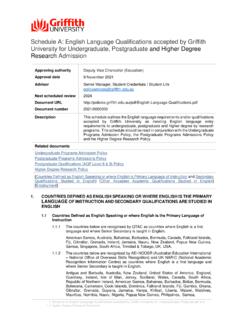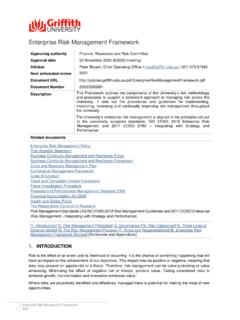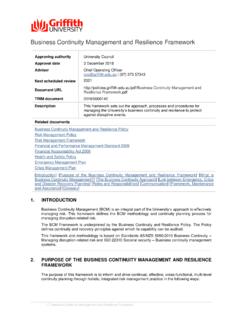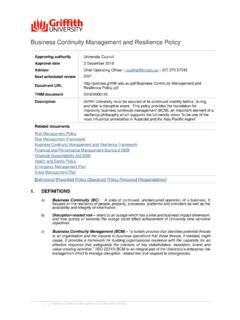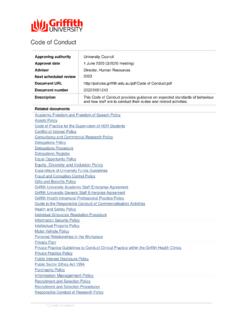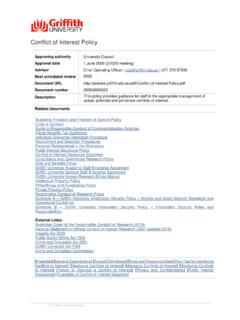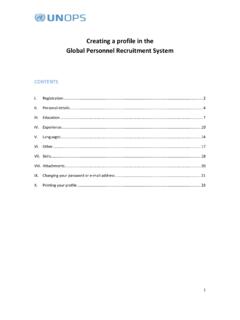Transcription of Postgraduate Qualifications (AQF Level 8 & 9) Policy
1 1 Postgraduate Qualifications (AQF Level 8 & 9) Policy Postgraduate Qualifications (AQF Level 8 & 9) Policy Approving authority Academic Committee Approval date 4 July 2022 (revised) Advisor Senior Manager, Student Credentials | Student Life Next scheduled review 2024 Document URL Qualifications Document number 2022/0000862 Description This Policy describes the Graduate Certificate, Graduate Diploma, and Masters Qualifications . It also defines the requirements for the double Masters degree . Related documents Student Administration Policy Academic Awards, Programs, Nomenclature and Abbreviations Credit and Recognition of Prior Learning Policy Course Catalogue, Coding and Other Course Attributes Policy Program and Course Policy Structure and Requirements of Qualifications Awarded by Griffith University [Scope] [Definitions] [Program and Award Titles] [Length of Postgraduate Programs] [Use of Courses from AQF Level 7 Qualifications ] [Research] [Graduate Certificate] [Graduate Diploma] [The Masters degree ] [Masters degree (Coursework)] [Masters degree (Research)] [Masters degree (Extended)] [Double Masters degree ] [Credit in Masters Degrees] [Conferring of Awards] 1.
2 SCOPE This Policy describes the Graduate Certificate, Graduate Diploma, and Masters Qualifications . The Graduate Certificate and the Graduate Diploma are located at Level 8 of the Australian Qualifications Framework (AQF). The Masters degree Coursework, Research and Extended are located at Level 9 of the AQF. The AQF Level and qualification type is indicated in the program title by the following nomenclature. Higher Education Awards AQF Level and qualification Type qualification Title Abbreviation 9 Masters (Extended)* * AQF allows a number of exceptions to the Award Descriptor for the Masters (extended) Doctor of Medicine, Physiotherapy, Dentistry D 9 Masters (Research) 9 Masters (Coursework) 9 Masters (Extended) Master of field of study M 8 Graduate Diploma Graduate Diploma of field of study GDip 8 Graduate Certificate Graduate Certificate in field of study GCert Students undertaking Graduate Certificate, Graduate Diploma, Coursework Masters or Extended Masters programs are designated as being in the Postgraduate career.
3 Students undertaking Masters 2 Postgraduate Qualifications (AQF Level 8 & 9) Policy Research programs are designated as being in the research career and are managed under the provisions of the Higher degree Research Policy . This Policy refers to these five AQF qualification types and provides guidance to assure the programs as approved Programs Committee are consistent with students acquiring the AQF learning outcomes (knowledge, skills, and application of knowledge and skills) as set out in the criteria and descriptors for these qualification types. 2. DEFINITIONS Advanced standing is the granting of block credit of a trimester/teaching period or more. Advanced standing indicates that the student is deemed to have satisfied all the program requirements that are embedded in the trimester(s)/teaching period(s) for which block credit has been awarded. Advanced standing reduces the number of courses the student must undertake to successfully complete the program.
4 AQF qualification is a completed University accredited program of learning that leads to formal certification that a graduate has achieved the learning outcomes as described in the AQF. Capstone course is a course which offers students nearing graduation the opportunity to summarise, evaluate and integrate learning from across a range of learning experiences to engage with a task which addresses a contemporary issue or problem facing a particular discipline or profession. Components of a qualification refer to units of academic work or courses, the completion of which leads to an AQF qualification . Coursework is a method of teaching and learning that leads to the acquisition of skills and knowledge that does not include a major research component. Discipline refers to a defined branch of study or learning consistent with the field of education classification in the Australian Standard Classification of Education (ASCED).
5 The ASCED includes 12 broad fields of education with each classification further divided into narrow and detailed fields of education. Same discipline Qualifications are designed to deepen knowledge, skills and application, and different discipline Qualifications are designed to broaden knowledge, skills and application through further learning. Higher degree by Research (HDR) refers to Research Masters or Research Doctorate where a: Research Masters means a Level 9 qualification as described in the Australian Qualifications Framework and where a minimum of two-thirds of the program of learning is for research, research training and independent study; Research Doctorate means a Level 10 qualification as described in the Australian Qualifications Framework and where a minimum of two years of the program of learning, and typically two-thirds of the qualification , is research.
6 Learning outcomes are the expression of the set of knowledge, skills and the application of the knowledge and skills a person has acquired and is able to demonstrate as a result of learning. Learning profile is a statement of an applicant s achievements of learning outcomes, knowledge, skills and competencies, supported by appropriate evidence, relevant to the particular program for which admission is sought. The Learning profile forms part of the Online Credit Application. Nested Qualifications are purposely designed Qualifications that enable explicit articulation pathways and encompass more than one AQF Level and/or qualification type. Prior learning is learning that has taken place prior to admission to a program of the University or prior to undertaking a relevant component of a program. Formal learning is the learning that takes place through a structured program of learning that leads to the full or partial achievement of an officially accredited qualification .
7 Examples of formal learning include study undertaken with other Australian Higher Education Providers and study at recognised overseas institutions. It also includes credentialed programs provided by recognised professional bodies, employers and other authorities. Non-formal learning refers to learning that takes place through a structured program of learning but does not lead to an officially accredited qualification . Examples of non-formal learning are: learning and training activities undertaken in the workplace, voluntary sector or in community-based settings. 3 Postgraduate Qualifications (AQF Level 8 & 9) Policy Informal learning is learning gained through work, social, family, hobby or leisure activities and experience. Unlike formal or non-formal learning, informal learning is not organised or externally structured in terms of objectives, time or learning support.
8 Research comprises systematic experimental and theoretical work, application and/or development that results in an increase in the dimensions of knowledge. The term research includes original, exploratory, experimental, applied, clinically or work-based and other forms of creative work undertaken systematically to increase knowledge and understanding, deploying a range of research principles and methodologies. Research is specified in the AQF learning outcomes for the Masters degree . The amount and type of research varies in each of the Masters degree Qualifications . 3. PROGRAM AND AWARD TITLES Postgraduate qualification titles (program and award titles) may indicate if the qualification has been achieved through research or coursework. Program and award titles are to include the term research where a minimum of two-thirds of the volume of learning is for research, research training and independent study.
9 4. LENGTH OF Postgraduate PROGRAMS The length of a Postgraduate program shall be approved by the Programs Committee. In considering the length of a program, the Programs Committee will give due regard to the aims of the program, the characteristics of the students who shall enter the program and, where applicable, professional accreditation requirements and, the length of similar programs in other institutions. Typical program lengths and weightings are set out in Table 1: TABLE 1 TYPICAL PROGRAM LENGTHS AND WEIGHTINGS AQF Level 8 qualification Volume of learning Weighting Graduate Certificate Typically 1 year Range 40CP- 80CP, typically 40CP Graduate Diploma Typically 1 - 2 years Range 80CP-160CP, typically 80CP AQF Level 9 qualification Volume of learning Weighting Masters Coursework Typically 1 2 years Range 80 -160CP, typically 80CP, 120CP & 160CP Masters Research Typically 1-2 years Range 80 -160CP, typically 80CP, 120CP & 160CP Masters Extended Typically 3 - 4 years Range 240 320CP, typically 240CP & 320CP 5.
10 USE OF COURSES FROM AQF Level 7 Qualifications Postgraduate Qualifications (AQF Level 8 & 9) are to consist predominantly of: courses designed specifically for Postgraduate programs for example: o Graduate Certificate (40CP) - AQF Level 8 - to have the balance of courses delivering Level 8 learning outcomes. o Graduate Diploma (80CP) - AQF Level 8 - to have the balance of courses delivering Level 8 learning outcomes. o Masters (Coursework or Research) (80CP, 120CP and 160CP) - AQF Level 9 - to have the balance of courses delivering Level 9 learning outcomes. 4 Postgraduate Qualifications (AQF Level 8 & 9) Policy courses with the same curriculum as undergraduate courses but with learning outcomes, teaching approaches and assessment strategies modified in a manner consistent with the qualification type and therefore recoded as Postgraduate (AQF Level 8 and 9) courses. For further information about recoding see Course Catalogue, Coding and Other Course Attributes Policy .
